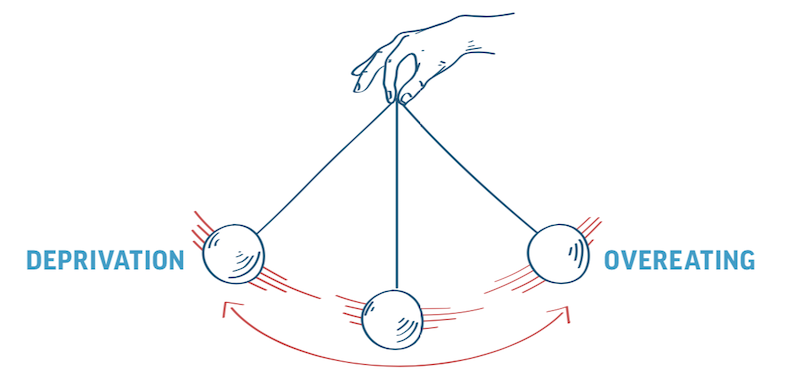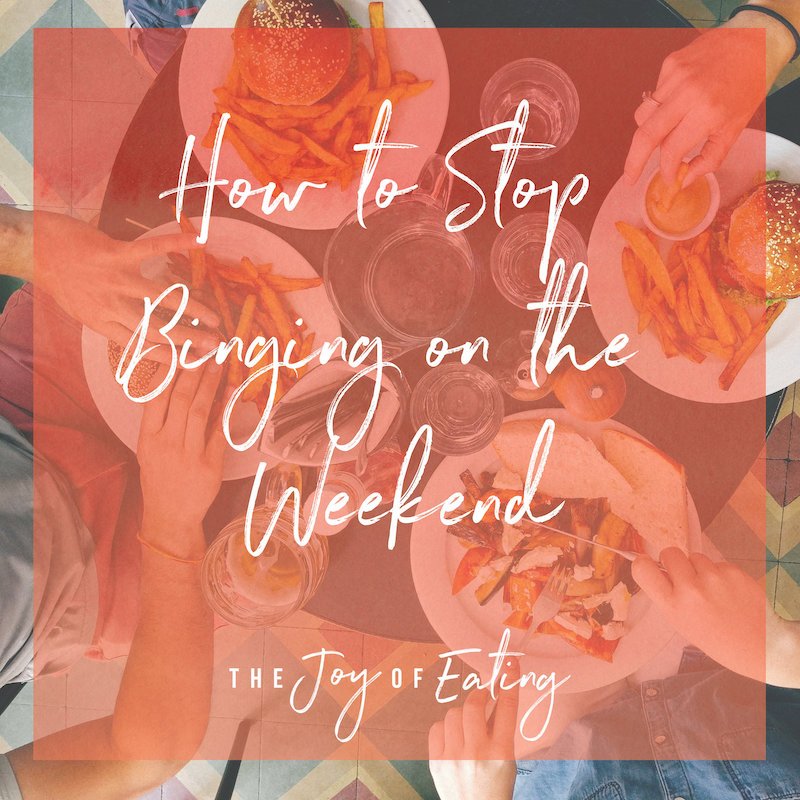Understanding the Restrict-Binge Cycle: The Dieting Pendulum
Trapped in a pattern of restricting and binging? The dieting pendulum analogy will help you understand the restrict-binge cycle, and give you tools for how to break free.
Unless someone is reaching out to work with us because they have been diagnosed with a restrictive eating disorder, most new clients are seeking support for what they perceive to be overeating.
That makes a lot of sense. In our society, restrictive eating behaviors are seen as having good willpower, while “overeating” is blamed on lack of discipline or moral failure. There’s a lot of shame over eating what’s deemed to be too much, while eating less is praised for pretty much everyone except those with the thinnest of bodies.
Because of that, clients are often surprised when our recommendation for “overeating” is very often to eat more. That’s because despite our cultural beliefs and stigmas, binging and “overeating” aren’t borne from lack of willpower or discipline. Most commonly, these behaviors are fueled by restriction.
Understanding the Restrict-Binge Cycle
The Dieting Pendulum
In thinking about how restriction fuels binging, I like to use the analogy of a pendulum, which I first learned from dietitian Christy Harrison.
Imagine a pendulum. On one side of the pendulum is restriction. This can exist as physical restriction, from not eating enough food overall, cutting out specific foods or food groups, or skipping meals or snacks. The restriction can also be the result of emotional restriction, where you may be allowing yourself to eat certain foods, but shaming yourself when you do (i.e. “uggh I was so bad for eating that cookie!”).
On the other side of the pendulum is overeating, or what I like to call “overeating,” because if it’s caused by undereating, is it really eating too much? Overeating might look like eating a stomach-ache inducing quantity of food or binge eating. It can also show up as making impulsive decisions around food, or generally feeling chaotic and out of control.
Now, imagine physically pulling a pendulum back towards the side of restriction, then letting go. The pendulum would swing wildly back towards overconsumption, right? And then it would swing chaotically back and forth for a bit before settling down, as long as you weren’t messing with it again.
If you've ever been on a diet, this feeling is probably something you're familiar with. The restrict-binge cycle feels awful when you’re tripped in it, especially for someone who is desperately trying to control their eating. If there’s one thing I want you to know about this cycle, it’s that it is absolutely not fueled by a lack of willpower or because there is something wrong with you. Binge eating is a typical outcome of restriction.
The Restrict-Binge Cycle is Your Body Trying to Protect You.
The oscillating action of a pendulum is predictable because it's controlled by gravity, a constant force of nature. Similarly, the restrict-binge cycle is fueled by another natural force - genetics. Namely, our body’s hardwired biology, designed to protect us against starvation.
As human beings, historically our greatest threat to survival was starvation. The fact that we’re around today is a testament our genetics, which allowed us (collectively) to survive long periods without adequate food. Basically, if an early human wasn’t eating enough, and wasn't highly motivated to seek out more food, they got the survival of the fittest treatment.
One of the ways your body protects you is by ramping up hunger hormones in response to restriction. Ghrelin, the main hunger hormone (I always remember it by thinking of a gremlin, which you might turn into when you’re hungry), stays elevated when you’re undernourished, even after a normal sized meal. In fact, a year after weight loss, ghrelin levels are still elevated while leptin, the fullness hormone, is suppressed. Your body is trying to signal, via hormones, for you to eat more food.
While not the most, ahem, ethical study, The Minnesota Starvation Project provided an illustrative example of what happens psychologically when someone isn’t eating enough food. The goal of the study was to better understand what happens to the body during starvation, and how to safely refeed. Of course, this was done by actually starving a group of 36 healthy young men, who were conscientious objectors to war during WWII. I will note that the amount of calories they were given daily is not what you would associate with starvation -around 1600-1800. Hopefully a reminder that we need much more food than you might think.
As the men dropped weight, besides the physical side effects of starvation (which were profound), they also became obsessed with food. The men began reading cookbooks, staying up late trading recipes, and even buying food for other people to watch them eat. The obsessions continued for months, and for some, years after being refeed. A rreminder for those of you still feeling crazy around food even though you’ve stopped dieting or have been physically renourished from an eating disorder.
The restrict-binge cycle can happen on a smaller scale as well. Not eating enough earlier in the day, intentionally or not, can lead to “overeating” or binging later on as the body tries to make up for what it missed. This is especially true for people who have a history of dieting or an eating disorder, as their body is more attuned and reactive to restriction. Basically, if your brain has experienced the trauma of starvation, it’ll be more primed to react the next time you’re underfed.
Thankfully, most people reading this aren’t worrying about where their next meal is coming from (many people still do, and food insecurity has been linked to eating disorders, and is simply unacceptable in the richest nation in the world. Reminder that Democratic legislators have introduced tons of legislation that would address it, especially child hunger, including the Child Tax Credit and Build Back Better - so please vote/call legislators/do what you can to get these bills passed into law. Now back to your regularly scheduled programming). However, many people still engage in a sort of self-imposed starvation called dieting. Your body doesn’t know that you’re not eating enough because you’re trying to lose weight - it just recognizes the calorie deficit and reacts. So stop blaming yourself and start thanking you body for protecting you!
How to Break Out of the Restrict-Binge Cycle
The natural tendency after a binge or overeating is to restrict or double down on food rules in an attempt to compensate. However, similar to pulling the pendulum back again, this just feeds into the same chaotic restrict-binge cycle. It feels better in the short term, but you’ll end up in the same place - binging, overeating, and feeling regret and shame over food.
When we work with clients who are trapped in the restrict-binge cycle, we focus first on removing restriction. This looks different from client to client, but generally consists of teaching them how to plan satisfying, balanced meals, eating at regular intervals, and incorporating fear foods. Essentially, we are teaching them to take their hands off the pendulum and stop pulling it back, and to keep their hands off. Just like a real pendulum, with time the oscillation between restriction and binging will slow down and settle.
Of course, eating consistently and adequately doesn’t mean you will never binge or “overeat” again. Normal, human being eating means sometimes eating more than what feels good, or making impulsive choices with food. It also might involve unintentionally not eating enough, which might cause you to eat more than what feels good later. Plus, for those who struggle with binge eating disorder, there can be much, much deeper feelings and emotions tied into eating that take time to untangle. However, with a nourished brain and body, you’ll have the headspace to learn other coping skills and strategies for healing.
Feeling trapped in the restrict-binge cycle? We work with clients virtually and out of our Columbia, SC office helping them foster a healthier relationship with food and feed themselves with confidence. Learn more about our practice philosophy and reach out if you’d like to work together.
This post on the restrict-binge cycle was originally posted May 2017 and it has been updated to give you the best possible content.








